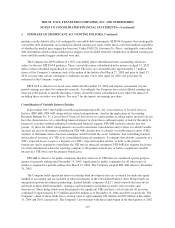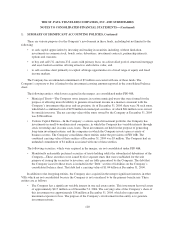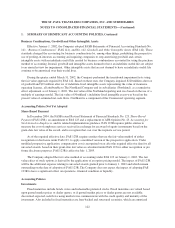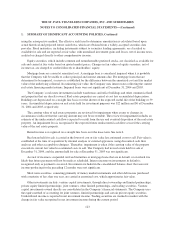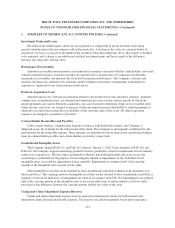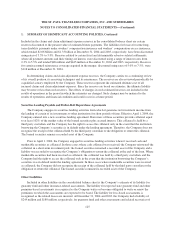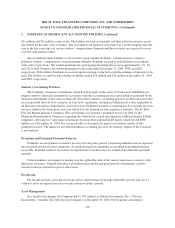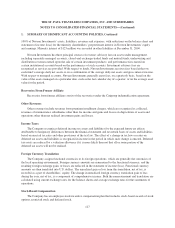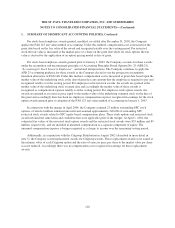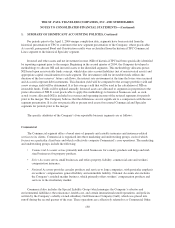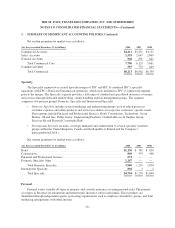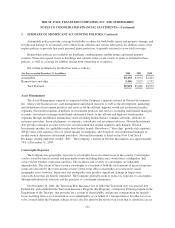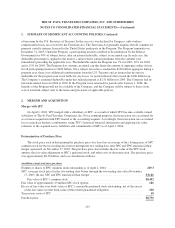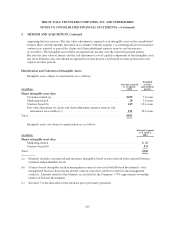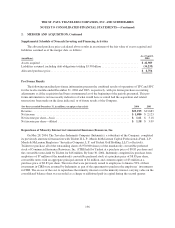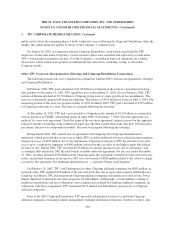Travelers 2004 Annual Report Download - page 141
Download and view the complete annual report
Please find page 141 of the 2004 Travelers annual report below. You can navigate through the pages in the report by either clicking on the pages listed below, or by using the keyword search tool below to find specific information within the annual report.
THE ST. PAUL TRAVELERS COMPANIES, INC. AND SUBSIDIARIES
NOTES TO CONSOLIDATED FINANCIAL STATEMENTS—(Continued)
1. SUMMARY OF SIGNIFICANT ACCOUNTING POLICIES, Continued
The following table illustrates the effect on net income (loss) and earnings per share for each period
indicated as if the Company had applied the fair value recognition provisions of FAS 123 to all outstanding and
unvested stock-based employee awards.
(for the year ended December 31, in millions, except per share data) 2004 2003 2002
Net income (loss) as reported ............................................. $ 955 $1,696 $ (27)
Add: Stock-based employee compensation expense included in reported net income,
net of related tax effects (1) ............................................. 49 18 17
Deduct: Stock-based employee compensation expense determined under fair value
based method, net of related tax effects (2) ................................. (75) (73) (96)
Net income (loss) pro forma .............................................. $ 929 $1,641 $ (106)
Earnings (loss) per share
Basic—as reported .................................................. $1.56 $ 3.91 $(0.07)
Basic—pro forma ................................................... 1.52 3.79 (0.25)
Diluted—as reported ................................................. 1.53 3.80 (0.07)
Diluted—pro forma .................................................. 1.49 3.76 (0.25)
(1) Represents compensation expense on all restricted stock awards and on stock option awards granted after
January 1, 2003.
(2) Includes the compensation expense added back in (1).
Derivative Financial Instruments
The Company may use derivative financial instruments, including interest rate swaps, equity swaps, credit
derivatives, options, forward contracts and financial futures, as a means of hedging exposure to interest rate,
equity price change and foreign currency risk. The Company’s insurance subsidiaries do not hold or issue
derivative instruments for trading purposes. The Company recognizes all derivatives, including certain derivative
instruments embedded in other contracts, as either assets or liabilities in the consolidated balance sheet and
measures those instruments at fair value. Where applicable, hedge accounting is used to account for derivatives.
To qualify for hedge accounting, the changes in value of the derivative must be expected to substantially offset
the changes in value of the hedged item. Hedges are monitored to ensure that there is a high correlation between
the derivative instruments and the hedged investment. Derivatives that do not qualify for hedge accounting are
marked to market with the changes in market value reflected in the consolidated statement of income in net
realized investment gains (losses).
Interest rate swaps, equity swaps, credit derivatives, options and forward contracts were not significant at
December 31, 2004 and 2003.
Nature of Operations
Upon completion of the merger on April 1, 2004, the Company was organized into four reportable business
segments: Commercial, Specialty, Personal (these three segments collectively represent the Company’s insurance
segments) and Asset Management. The insurance segments reflect how the Company manages its property and
casualty insurance products and insurance-related services and represent an aggregation of these products and
services based on type of customer, how the business is marketed, and the manner in which the business is
underwritten. The Asset Management segment comprises the Company’s 79% interest in Nuveen Investments.
129


